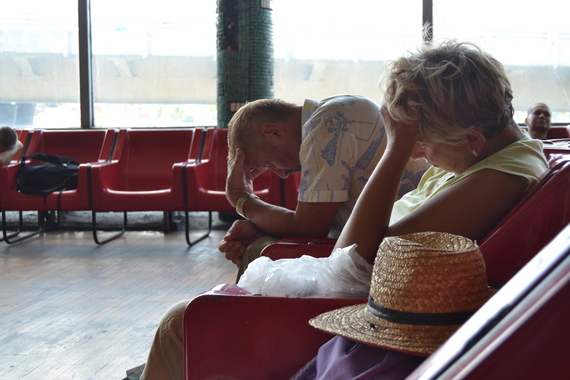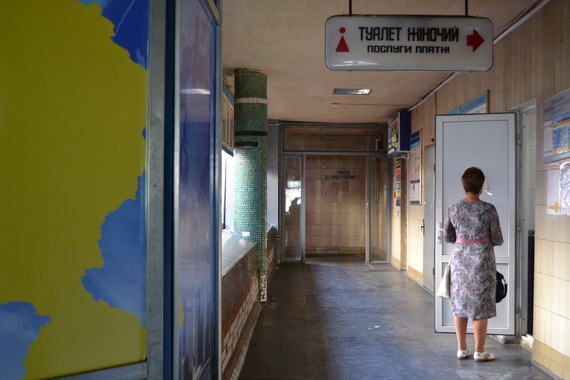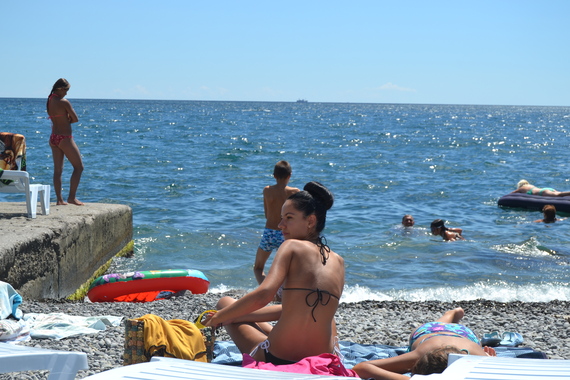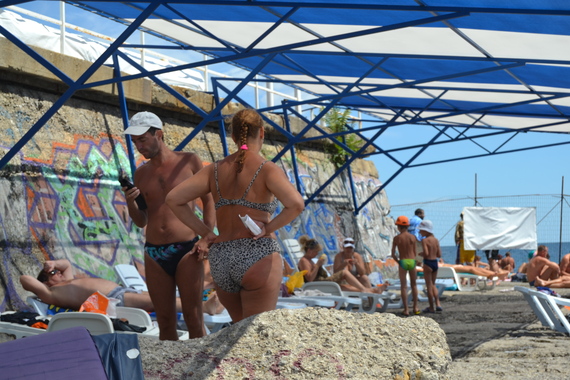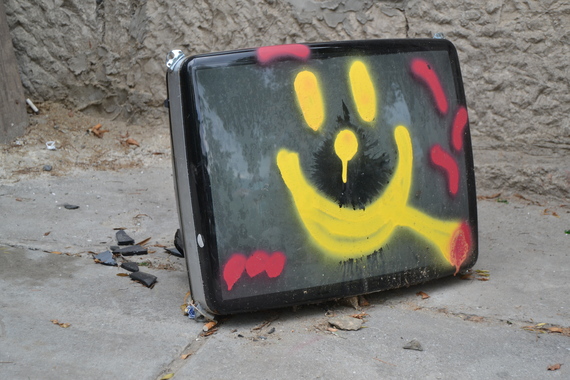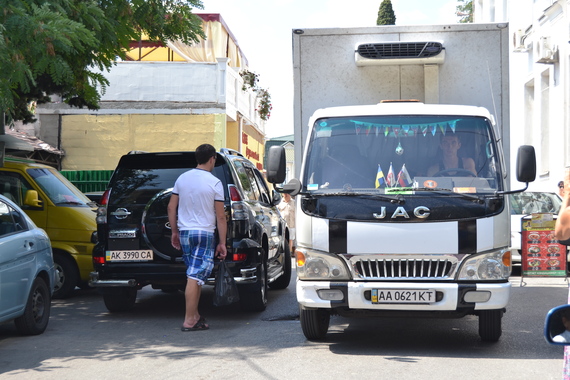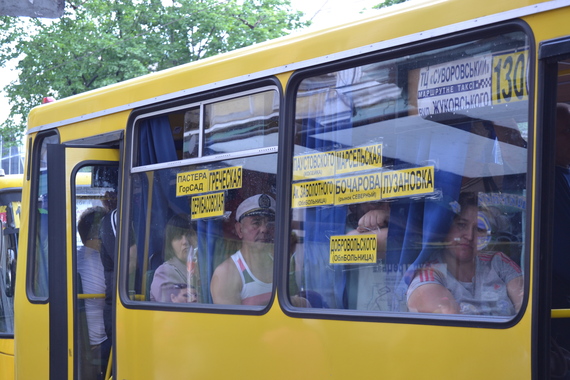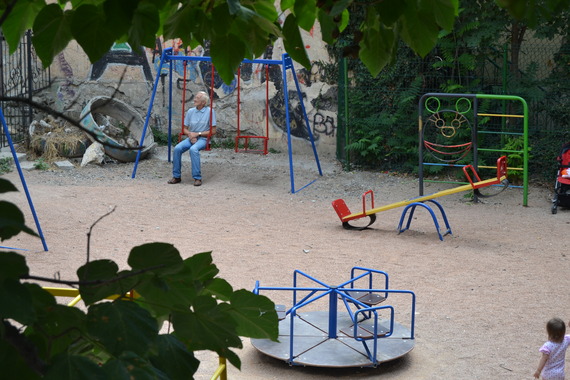The air lagged with laziness in the late summer afternoon. It was the sort of August day where even sitting makes you tired. After two months of traveling and countless hours deciphering Cyrillic, I'd come to the final excursion on my European tour: Crimea.
Before Ukraine's recent protests, most Americans had never heard of Crimea. Admittedly, I didn't know much about the region before I decided to vacation there. I was with my dad's fiancée Natalya and her brother Sergio, and instead of spending the week in a lonely Kiev apartment, we decided to venture to Crimea on a 19-hour bus ride.
"You want to go to Krym, da? It's really pretty there." Natalya asked.
"...Yeah. Let's do that," I smiled.
The way Natalya described Yalta, it seemed like any coastal resort town in any part of the world. Of course, there were certain staples I'd become accustomed to in Eastern Europe: haggling for an apartment at the bus stop, overpriced beach treats and smooth-stone beaches.
My three days there were spent sunbathing, capturing the scene on camera, and swimming in the refreshing Black Sea. Spending time on the crowded beach in linguistic isolation made me grateful for any new friends, even little kids who warned me about slimy jellyfish. Unable to properly interact, I tried to step outside of my Western filter to understand what I saw. I had never seen children eat corn-on-the-cob beachside or graffitied concrete along the beach.
Months before any signs of protest, Natalya did mention that Russians wanted Crimea -- but for reasons other than a political scientist might speculate.
"Russians really like the Black Sea. They used to have Krym, and they've wanted it back. Russia's cold, and Krym has nice beaches!" I didn't push, but I sensed there was slight tension here. I figured the area famous for its beaches would also be coveted for the same reason, so I didn't think much of it.
My time spent in Ukraine was spent trying to understand the country and its culture. After a few days there together, my brother and I jokingly concluded we may as well expect the least expected -- if anywhere, it would happen here.
I've been from India to South Africa, but I'd never felt as foreign as I did in Ukraine. Call it American ignorance, but we hopped off the plane and assumed at least one person could speak English and direct us to Odessa. Nyet. Turns out Dad was 10 hours away by train, meaning Aneil and I would have to navigate Ukraine through a crash course in Russian.
That was another thing -- most of the people there spoke Russian. Our airport cab driver and savior, Alex, clarified this as if there was nothing strange about half of the population speaking Russian and the other Ukrainian. In Kiev, it was about 50/50; in our destination of Odessa, it was 75/25, Russian/Ukrainian. We asked why, but the answer was more complex than Alex could communicate in English. Instead, he taught us Ukrainian words, and we did our best to teach ourselves in hopes of eventually reaching our dad.
Aneil and I gleaned what information we could, a continued struggle with the language barrier. Alex mentioned that, sometimes, the police stop drivers and take their money. We laughed a bit nervously. We were already overwhelmed with helplessness, and we didn't have enough hryvinia to pay off crooked cops. We grew more suspicious after Alex bought our train tickets, saying it would be easier if he bought them so the police wouldn't ask questions.
I felt I needed to catch up with what was happening in Ukraine. One quick Google search later and I was quickly turned off. I found reports of the detainment of a previous prime minister and a police officer convicted of decapitating a journalist.
I figured it was best if I didn't ask about the political climate -- understanding the language was enough of a task, and I figured I couldn't make a fair judgment without the ability to communicate with the majority of the population. It wasn't my country, so I didn't see it fit to interject into its politics without spending some time there.
On the flight home, I read about interest in Ukrainian resources not only from Russia, but also the European Union. Where intentions lie with these two entities is questionable -- I would reason that both are interested in what Ukraine has to offer rather than Ukraine being justly compensated for their resources.
On my last day in Ukraine, I stopped asking so many questions, letting every experience sink in. As the language barrier wore down, some Russian sneaked into my subconscious. I could read street signs and order coffee. Sure, things were different, but they weren't that different, after all.
Having spent two weeks there, I understand Ukraine more than I ever could have from the United States. Watching politicians, journalists and concerned citizens all over the world debate over what should be done reminds me of my own effort to understand Ukraine. My conclusion? I needed to do a lot more research before I engaged myself with an opinion. I needed to listen in Russian and Ukrainian rather than English to truly understand what was going on. Like any place in the world, not every citizen is aware of the political storm brewing in diplomatic chambers. From what Natalya divulged in August, the tug-of-war over Crimea seemed more about Black Sea sunbathing than strategic ports. After a phone call two weeks ago, I heard that tensions were far from Natalya's southwestern village, which is located in a predominantly nationalist Ukrainian area. Ukraine is an expansive country, and though the capital sees discord, the rest of the nation continues to function.
It's never easy when a nation is divided by ethnic identity, something difficult to understand as an American. I can only empathize after a few weeks spent in Eastern Europe, having merely scratched the surface of identity conflicts in the region.
Wandering around Kiev, I realized how much I was missing with my handful of Russian words. "I really want to go to Russia now," I sighed.
"Yes, Russia is nice. I went when I was little. I don't really remember, but it is nice. Nicer than Ukraine," Natalya laughed wistfully.
In small phrases like this, an impression formed in my head. It is important to remember Ukraine's long-standing struggle for identity, an identity distinct from Russia. A generation ago, Ukraine was a Soviet state, which inevitably altered self-perception in identity. Natalya was part Russian, remembering her family who lived there, lived nicer. The two nations are intricately tied, and it isn't difficult to imagine blurred lines with a country that speaks the same language, includes the same family, yet retains a distinct identity.
It is ultimately the decision of Ukrainians to choose how they identify. Some may identify with Ukraine yet speak Russian. Others may claim their Ukrainian roots yet want the country to remain together. I can't speculate on how each Ukrainian identifies, but their identity comes from a rich Ukrainian history and long ties to Russia.
One can still see remnants of this time in large, concrete buildings and Russian billboards. Ukraine resembles Russia in many ways, but as Natalya pointedly reminded me, we were in Ukraine.
